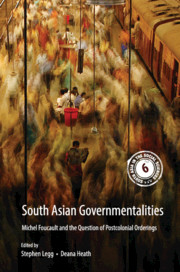Book contents
- Frontmatter
- Contents
- Acknowledgements
- Introductions
- Histories and Presents
- Subjects and Matters
- 7 Do Elephants Have Souls? Animal Subjectivities and Colonial Encounters
- 8 Plastic History, Caste and the Government of Things in Modern India
- 9 Changing the Subject: From Feminist Governmentality to Technologies of the (Feminist) Self
- 10 The Tortured Body: The Irrevocable Tension between Sovereign and Biopower in Colonial Indian Technologies of Rule
- Reflection
- Contributors
- Index
7 - Do Elephants Have Souls? Animal Subjectivities and Colonial Encounters
from Subjects and Matters
Published online by Cambridge University Press: 28 October 2018
- Frontmatter
- Contents
- Acknowledgements
- Introductions
- Histories and Presents
- Subjects and Matters
- 7 Do Elephants Have Souls? Animal Subjectivities and Colonial Encounters
- 8 Plastic History, Caste and the Government of Things in Modern India
- 9 Changing the Subject: From Feminist Governmentality to Technologies of the (Feminist) Self
- 10 The Tortured Body: The Irrevocable Tension between Sovereign and Biopower in Colonial Indian Technologies of Rule
- Reflection
- Contributors
- Index
Summary
The body of the creature
The recent rise in animal histories of colonial Asia has contributed mostly to our understanding of the imperial control of human populations. Histories examining hunting, vermin eradication, cow protection, veterinary science and laboratory experimentation have revealed how imperial attempts to regulate human-animal interactions shaped ‘political rationalities’ in India (Adcock, 2010; Chakrabarti, 2010; Hussain, 2012; Mishra, 2011; Pandian, 2001; Rangarajan, 1998). But in the wider field of animal studies, historians and geographers have urged scholars to go further and to take account of the materiality and even the agency of animals. Some have argued that today's scientific understandings of animals’ sensory worlds can enable us to explore the subjective experience of animals in the past (Fudge, 2013; Hribal, 2003; Philo and Wilbert, 2000b; Ritvo, 2004; Rothfels, 2010). These calls raise particular challenges for those of us influenced by Foucauldian approaches and thus habitually wary of reifying the products of historically contingent arrangements of power–knowledge. This chapter addresses this issue of animal subjectivity through imperial representations of elephants in colonial Burma – creatures often noted to be playful, clever and occasionally, vindictive. By returning to Foucault's work, particularly through Judith Butler's reading of his ‘political anatomy’, I argue for a reconceiving of the problem of animal subjectivity as a process of materialisation.
First, in order to illustrate the problem of animal subjectivity, I begin, as Foucault might have, with a body in pain:
Now he had to be punished and made to learn that man was his master. Unless Ngwe Maung was made to realise this without question he would always continue to be a menace to human society. He had, therefore to be taught a lesson he would never forget. It was, therefore, with much reluctance that Ngwe Maung had to be learnt the lesson of fear by means, most dreaded by the animal kingdom – of burning! Having made quite sure that Ngwe Maung was securely fastened flares and torches of paraffin were brought up and applied. This brutal treatment was most effective and within seconds Ngwe Maung was screaming and trumpeting, not this time with rage, but with fear and pain.
- Type
- Chapter
- Information
- South Asian GovernmentalitiesMichel Foucault and the Question of Postcolonial Orderings, pp. 159 - 177Publisher: Cambridge University PressPrint publication year: 2018
- 3
- Cited by



